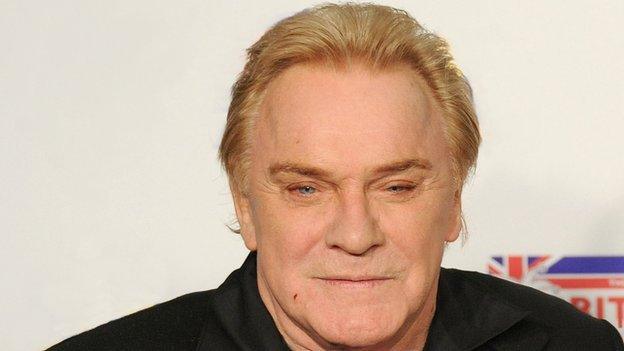Freddie Starr will not be prosecuted, CPS confirms
- Published
Freddie Starr's lawyer Dean Dunham: "He's a man of good character and today that's been proven"
Entertainer Freddie Starr will not be prosecuted over sex offence allegations because of "insufficient evidence" on most claims, prosecutors have said.
The Crown Prosecution Service said there was "a realistic prospect of conviction" in one case but it was not in the public interest to prosecute.
Mr Starr has been on bail since being arrested by Operation Yewtree officers.
Mr Starr's lawyer accused police of a "flagrant breach" of his client's human rights due to delays in the case.
Mr Starr, 71, was first questioned in November 2012, and has always denied any wrongdoing.
'Carefully reviewed'
Baljit Ubhey, the Chief Crown Prosecutor of CPS London, said the case had been "carefully reviewed".
The CPS decided there was insufficient evidence to prosecute Mr Starr in relation to allegations of sexual offences made by 13 people.
Ms Ubhey said: "Each allegation was considered on its own merits and we have concluded that the available evidence does not offer a realistic prospect of conviction for any of the alleged offences."
In the case of a 14th complainant, the CPS said although there was sufficient evidence for a realistic prospect of conviction, according to the Code for Crown Prosecutors a prosecution would not be in the public interest.
The BBC understands prosecutors decided not to pursue a conviction in that case because it was unlikely Mr Starr would be jailed if found guilty.
Ms Ubhey added: "It must be remembered that a determination by a prosecutor that there is sufficient evidence to prosecute under the code does not mean that the suspect is guilty of the offence.
"Prosecutors have to consider whether there is enough evidence to bring a case to trial but deciding whether an offence has been committed is entirely a matter for courts and juries and every suspect is innocent until proven guilty."
She said the complainants had been told and would be written to to explain the decisions more fully.
BBC home affairs correspondent Dominic Casciani said there were a number of possible reasons prosecutors sometimes decided not to go to court despite believing they had enough evidence.
They include the seriousness of the crime, the harm inflicted and the possible impact a prosecution could have on the victim.
Ms Ubhey said: "It must be remembered that a determination by a prosecutor that there is sufficient evidence to prosecute under the code does not mean that the suspect is guilty of the offence."
'Toll taken'

There was "insufficient evidence" to prosecute, the CPS said
Mr Starr later appeared outside his Warwickshire home with his lawyer Dean Dunham.
Mr Dunham said "there was simply never any evidence in this matter that was anywhere near sufficient" to keep his client on bail for so long.
He added: "We will be looking at this further. Things have gone wrong here. I have lived this nearly every day with Freddie and you can see the toll it has taken on him.
"He's a man of good character, remains a man of good character, and I would ask the public now to stand by this man. No doubt about it, his innocence has been proven."
Mr Starr said he was "very relieved" and, asked if he had a message for his fans, said: "Thank you."
Mr Dunham said his client would be making a full public statement within the next few days.
Operation Yewtree is an inquiry into allegations of historical sexual abuse linked to the entertainment industry.
It was launched in 2012 after it emerged the late BBC Radio One DJ and television presenter Jimmy Savile had abused hundreds of young people and children over more than five decades.